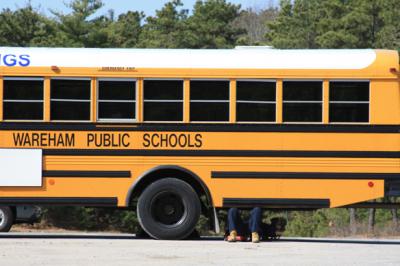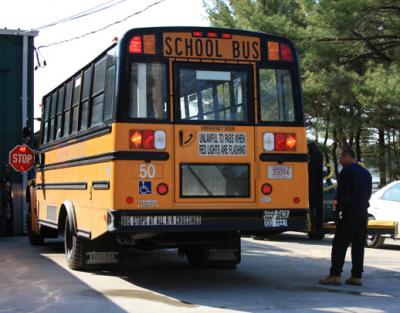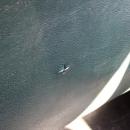Buses are old, but without unusual safety record
The number of Wareham school buses being taken out of service for mechanical issues is "a bit higher than average," which is likely due to the district's aging vehicles, according to the Registry of Motor Vehicles (RMV).
"We think what accounts for that [number] is, like a lot of school districts, [Wareham] has an older fleet of buses," said RMV Communications Director Ann Dufresne. "That demands more of a proactive maintenance schedule, which obviously requires funding and revenue to run."
The number of Wareham school bus inspection failures has been addressed in Board of Selectmen meetings in recent weeks. Resident Ellen Begley, who requested the past two years of inspection records from the school district after hearing media reports that the buses were in a "state of disrepair," requested the Board of Selectmen's help obtaining them after Wareham Public Schools Superintendent Barry Rabinovitch told her the request would cost $851.77.
"As a taxpayer in Wareham, I feel that if some concerns are raised regarding the safety of transportation for our Wareham students, then those concerns should be a matter of complete public disclosure," Begley said at a Selectmen's meeting.
Begley said she obtained the records through Town Administrator Mark Andrews, who helped her with the request and forwarded it to Rabinovitch. If a town committee or board requests the documents, a fee is not charged.
At the April 20 Board of Selectmen meeting, Begley presented information from the records, which indicated that of the 328 school buses inspected between 2008 and 2010, 190 failed and 147 were taken out of service, Begley said. The numbers caused concern that students' safety was put at risk.
Dufresne said that was not the case.
"The whole point of inspections [is] to catch any safety issues before they happen or before they get worse," Dufresne said. "So at no point have children been put at risk."
The district's fleet includes 51 buses, 20 of which are ten years old or older. The industry standard is to replace buses every three to five years, Rabinovitch said. He said the district does not have the funds to replace buses that often.
RMV inspectors are sent directly to bus yards to complete inspections, which occur three times per year. They only inspect school buses during those trips, not vans or other vehicles that transport students. Those require different inspections and are taken to an outside garage, said Wareham Public Schools Transportation Director Mary Jane Driscoll.
Buses can pass or fail an inspection or be taken out of service, Dufrense said. Failures can be caused by anything from a cracked mirror to insufficient or uneven tread on a tire. If a bus fails an inspection, it is repaired by district mechanics, reinspected, and then given its passing inspection sticker that same day, she said.
Buses are taken out of service for major repairs that usually cannot be completed on-the-spot, though some are fixed the same day.
Buses can also be granted an "E.Q.," which stands for equipment quality. Those vehicles are given a passing inspection sticker with the requirement that necessary repairs are completed and reported to the RMV within seven days, Driscoll said. A bus can be given an E.Q. for issues such as ripped or loose seats.
The RMV completed a round of Wareham school bus inspections on April 22 and 23. Of the 16 buses inspected, three failed, were repaired, and subsequently passed, Dufresne said.
Four buses were taken out of service; one for a suspension issue, another for an exhaust leak, one for a fluid leak, and one for brakes being out of adjustment, Dufresne said. Mechanics were also able to repair those buses during the inspector's visit, and the vehicles were reinspected and put back into service.
Dufresne said that the RMV recommends that school districts utilize a preventative maintenance schedule rather than depending on state inspections for maintenance.
Wareham Public Schools mechanics have a routine maintenance program in which mechanics inspect each vehicle one-at-a-time, Driscoll said. The mechanics change fluids and look for any problems or potential problems that need to be addressed.
Bus drivers also complete "circle checks" each day before transporting students. They examine the buses for any problems, including issues that would cause the vehicle to fail inspection, Rabinovitch said.
If a bus driver finds something wrong with a bus, that bus is looked at before the next bus in line for routine maintenance, Driscoll said. When mechanics finish examining the last bus, they move on to the first one and repeat the cycle. The cycle can take weeks, depending on issues the mechanics must address, she said.
Separate from the thrice-per-year RMV inspections, which are more in-depth due to RMV regulations for transporting students, the district is required to annually inspect buses in a manner similar to the way personal vehicles are inspected, Rabinovitch said.
The district purchased a machine last year that allows its mechanics to perform those inspections in-house - a money-saving measure, Rabinovitch said. The buses previously had to be taken to a garage for those inspections, with each costing about $130 per bus. In-home inspection costs $6 per bus, Rabinovitch said.
The inspection machine cost $10,000 and was purchased out of the Transportation Department's revolving account, Rabinovitch said. The money in the revolving account is a result of fees charged when Wareham transports out-of-district children.
The inspection machine can be used on all town vehicles, Rabinovitch said. It was recently used to inspect the new fleet of police vehicles.
Wareham Public Schools has been running its own transportation department since the 1980s, an alternative to hiring a private bus company to transport students. Studies done five and ten years ago determined that it was cheaper for the district to continue operating its own fleet, Rabinovitch said.
"The long-term solution to this is to support a capital improvement plan that will change the buses so that after seven years, you're buying new buses," Rabinovitch said. Currently, two buses can be purchased each year out of the revolving account at no additional expense to the town.
Rabinovitch said School Committee Chairman Clifford Sylvia is planning to form a subcommittee consisting of members of that committee, the Board of Selectmen, and Finance Committee to discuss issues that need to be addressed within the school district. The School Committee will likely discuss the subcommittee during its next meeting on May 12, Rabinovitch said.
Rabinovitch maintains, as does the RMV, that Wareham students are safe on the buses. "The Registry [of Motor Vehicles] would not put an inspection sticker allowing students to ride the vehicles unless they believed them to be safe," he said. "Would we have less mechanical problems if the buses were newer? Absolutely. But just like when you drive your car for ten years and you put 200,000 miles on it, you're bound to bring it to the shop more often."
Dufresne echoed his statement: "Safety is our number one concern, and that's why we have the inspection program."
Watch a Wareham school bus get its brakes tested during a Registry of Motor Vehicles inspection.
















